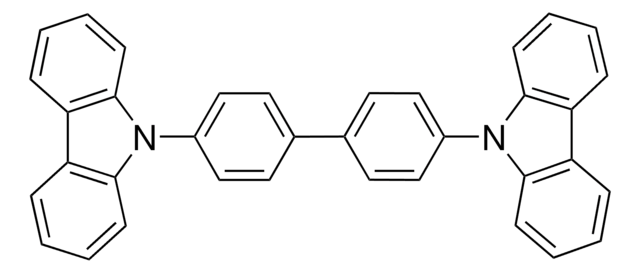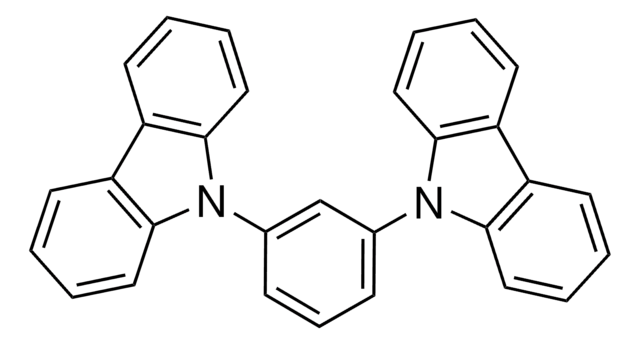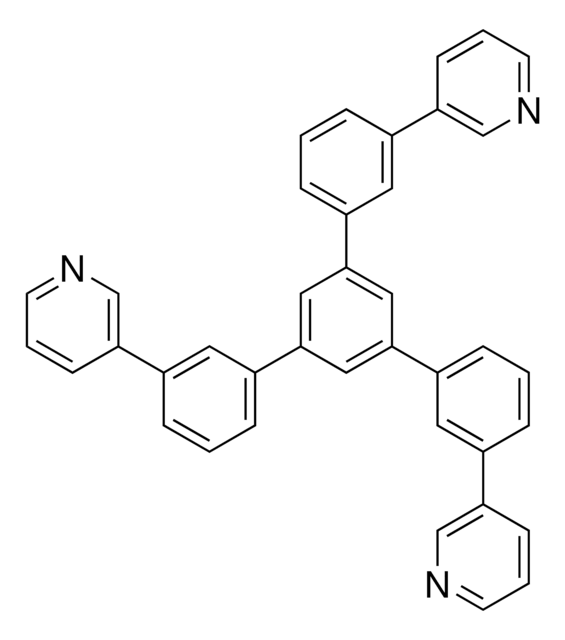699195
4,4′-Bis(N-carbazolyl)-1,1′-biphenyl
sublimed grade, 99.9% trace metals basis
Synonym(s):
4,4′-Bis(9-carbazolyl)-1,1′-biphenyl, 4,4-N,N′-Dicarbazole-1,1′-biphenyl, CBP, DCBP
About This Item
Recommended Products
grade
sublimed grade
Quality Level
Assay
99.9% trace metals basis
form
solid
greener alternative product characteristics
Design for Energy Efficiency
Learn more about the Principles of Green Chemistry.
sustainability
Greener Alternative Product
loss
0.5 wt. % loss on heating, 279.6 °C (typical, TGA)
mp
277.9 °C (typical, DSC)
281-285 °C
λmax
532 nm
Orbital energy
HOMO 6 eV
LUMO 2.9 eV
OLED Device Performance
ITO/HMPD/CBP:Ir(ppy)3 (6%)/Alq3/Mg:Ag
ITO/MoO3/CBP/CBP:Ir(ppy)2(acac) (6%)/TPBI/LiF/Al
ITO/NPD/CBP:Ir(ppy)3 (6%)/Alq3/Mg:Ag
ITO/NPD/CBP:Ir(ppy)3 (6%)/niBr/Alq3/Mg:Ag
ITO/NPD/CBP:Ir(ppy)3/BCP/Alq3/Mg:Al
ITO/PEDOT:PSS/NPD/CBP:Ir(piq)3 (6 wt%)/Alq3/LiF/Al
ITO/TAPC/CBP:FIrpic (6%)/PO14/LiF/Al
greener alternative category
SMILES string
c1ccc2c(c1)n(-c3ccc(cc3)-c4ccc(cc4)-n5c6ccccc6c7ccccc57)c8ccccc28
InChI
1S/C36H24N2/c1-5-13-33-29(9-1)30-10-2-6-14-34(30)37(33)27-21-17-25(18-22-27)26-19-23-28(24-20-26)38-35-15-7-3-11-31(35)32-12-4-8-16-36(32)38/h1-24H
InChI key
VFUDMQLBKNMONU-UHFFFAOYSA-N
Looking for similar products? Visit Product Comparison Guide
General description
Signal Word
Danger
Hazard Statements
Precautionary Statements
Hazard Classifications
Eye Dam. 1 - Skin Irrit. 2 - STOT SE 3
Target Organs
Respiratory system
Storage Class Code
11 - Combustible Solids
WGK
WGK 3
Flash Point(F)
Not applicable
Flash Point(C)
Not applicable
Personal Protective Equipment
Certificates of Analysis (COA)
Search for Certificates of Analysis (COA) by entering the products Lot/Batch Number. Lot and Batch Numbers can be found on a product’s label following the words ‘Lot’ or ‘Batch’.
Already Own This Product?
Find documentation for the products that you have recently purchased in the Document Library.
Customers Also Viewed
Articles
Plexcore® organic conductive inks are electronic grade inks formulated for use in the hole injection layers of OLEDs.
Sublimed materials for organic electronic devices such of OFETs and OTFTs allow the achievement of better electronic properties, and may help increase a device’s lifetime.
In this article, we demonstrate that bis-styrylbenzene derivatives show promising characteristics for very low lasing thresholds and discuss the design considerations for organic lasing molecules.
Since their discovery, organic light emitting devices (OLEDs) have evolved from a scientific curiosity into a technology with applications in flat panel displays and the potential to revolutionize the lighting market. During their relatively short history, the technology has rapidly advanced, and device efficiencies have increased more than 20-fold, approaching the theoretical limit for internal quantum efficiencies.
Our team of scientists has experience in all areas of research including Life Science, Material Science, Chemical Synthesis, Chromatography, Analytical and many others.
Contact Technical Service









